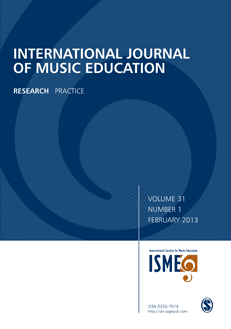
International Journal of Music Education
Scope & Guideline
Transforming music education through innovative research.
Introduction
Aims and Scopes
- Innovative Teaching Methodologies:
The journal emphasizes the exploration of innovative pedagogical approaches in music education, including flipped classrooms, collaborative learning, and technology-enhanced methodologies. - Diversity and Inclusion in Music Education:
There is a strong focus on promoting diversity within music education, addressing issues related to multiculturalism, equity, and the inclusion of underrepresented groups in music curricula. - Health and Wellbeing in Music Education:
Research that investigates the psychological and physical aspects of music education, including performance anxiety, teacher wellbeing, and the cognitive benefits of music engagement, is a central theme. - Assessment and Evaluation Practices:
The journal features studies on developing and standardizing assessment tools and evaluation methods for music education, aiming to improve educational outcomes and pedagogical practices. - Community Engagement and Music Education:
Exploration of the role of music education in community settings, including outreach programs and collaborative projects that foster community ties through music. - International Perspectives and Practices:
The journal includes research that offers international insights into music education practices, comparing and contrasting different educational systems and cultural contexts.
Trending and Emerging
- Technology Integration in Music Education:
There is a growing trend towards the use of technology in music education, including digital tools for teaching, online learning environments, and mobile applications that enhance music learning. - Mental Health and Music Education:
An increasing number of studies focus on the mental health implications of music education, including coping strategies for performance anxiety and the overall wellbeing of music students. - Collaborative and Community-Based Music Education:
Research exploring collaborative music-making and community engagement is on the rise, emphasizing the importance of social interaction and collective learning in music. - Culturally Responsive Pedagogy:
There is a significant emphasis on culturally responsive teaching practices that recognize and incorporate diverse musical traditions and cultural contexts into the curriculum. - Interdisciplinary Approaches:
An emerging trend is the integration of music education with other disciplines, such as STEAM (Science, Technology, Engineering, Arts, and Mathematics), reflecting a holistic approach to education.
Declining or Waning
- Traditional Music Pedagogy:
There appears to be a waning emphasis on traditional music teaching methods, as more innovative and contemporary approaches gain traction in the literature. - Focus on Classical Music:
Research centered exclusively on classical music education is declining, with a noticeable shift toward popular music and diverse musical genres in educational contexts. - Individual Performance Assessment:
There is a reduction in studies focusing solely on individual performance assessments, as the journal increasingly emphasizes collaborative and ensemble-based learning. - Historical Perspectives in Music Education:
Research that concentrates on historical approaches to music education is becoming less common, potentially overshadowed by current pedagogical innovations and practices. - Standardized Curricula:
The emphasis on standardized curricula is decreasing, as the journal highlights the importance of adaptive and culturally responsive teaching practices.
Similar Journals

Information and Communication Technology in Musical Field
Exploring the Harmony of Technology and SoundInformation and Communication Technology in Musical Field is an esteemed academic journal published by MEDIA MUSICA, dedicated to exploring the intersections of technology and music. With an ISSN of 2067-9408 and an E-ISSN of 2069-654X, this journal serves as a vital resource for researchers, professionals, and students interested in the latest advancements and applications of information and communication technologies within the musical sphere. While specific impact factor metrics are currently unavailable, the journal aims to provide a platform for high-quality research that fosters innovation in music production, distribution, and theory. The implications of technology in music are profound, influencing everything from composition to performance and consumption, and this journal strives to illuminate these transformative changes. Located in Cluj-Napoca, Romania, at STR ICBRATIANU NR 25, this publication encourages submissions that contribute to the diverse dialogue surrounding music and technology, ensuring that it remains an essential reference for those at the forefront of this dynamic field.

Malaysian Journal of Music
Exploring the Rhythms of Southeast AsiaThe Malaysian Journal of Music is a distinguished academic publication dedicated to the exploration and advancement of music and cultural studies within the Southeast Asian context. Published by UNIV PENDIDIKAN SULTAN IDRIS, FACULTY OF MUSIC & PERFORMING ARTS, this journal contributes significantly to the field by disseminating high-quality research and scholarship related to both traditional and contemporary music practices in Malaysia and beyond. Since its inception in 2018, the journal has earned a Q3 categorization in both Cultural Studies and Music, reflecting its commitment to fostering a comprehensive understanding of these interdisciplinary areas. As of now, it ranks 90th out of 180 in the domain of Arts and Humanities focused on Music, positioning it firmly within the academic discourse. The Malaysian Journal of Music serves as an invaluable resource for researchers, professionals, and students alike, providing insights into the rich tapestry of music, culture, and their societal impacts. The journal is dedicated to open access publishing, ensuring that knowledge is shared widely and freely, further solidifying its role as a cornerstone for music scholarship in Malaysia.

Problemy Muzykalnoi Nauki-Music Scholarship
Fostering Insight into Music's Socio-Cultural ImpactWelcome to Problemy Muzykalnoi Nauki-Music Scholarship, a leading journal in the field of music scholarship published by the esteemed Gnesin Russian Academy of Music. With an ISSN of 2782-358X and an E-ISSN of 2782-3598, this Open Access journal has been committed to the dissemination of high-quality research since 2009, making scholarly work accessible to a global audience. Covering diverse aspects of music theory, history, and its socio-cultural impacts, Problemy Muzykalnoi Nauki serves as an essential platform for scholars, educators, and practitioners in the arts and humanities, as well as in social sciences related to music education. While its Scopus coverage was discontinued in 2021, the journal remains influential, holding a rank of #48 in the Arts and Humanities category and a percentile of 67th, showcasing its relevance and rigor in the discipline. We invite researchers and students alike to explore the rich contributions made within these pages, fostering a deeper understanding and appreciation of music in contemporary society.
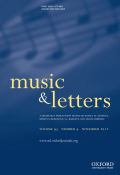
MUSIC & LETTERS
Unveiling the Rich Tapestry of Musical NarrativesMUSIC & LETTERS, published by Oxford University Press, is a prominent academic journal that has been at the forefront of musicology and music studies since its inception in 1920. With an ISSN of 0027-4224 and an E-ISSN of 1477-4631, the journal provides a platform for scholarly articles that explore the rich interplay between music and literature, contributing significantly to the understanding of musical context, form, and societal impact. As of 2023, it holds a respectable Q3 rank in Music within its category, positioned at Rank #66 out of 180 in the Scopus Arts and Humanities Music category. Despite not being an Open Access journal, its rigorous peer-review process and commitment to high-quality research make it an essential resource for researchers, professionals, and students alike. The journal's scope encompasses various genres and historical periods, ensuring a comprehensive examination of music's role in culture and community, thereby enhancing the scholarly discourse within this vibrant field. Based in the United Kingdom, at Great Clarendon St, Oxford OX2 6DP, England, MUSIC & LETTERS continues to inspire and inform the global music scholarly community.

MUSIK UND KIRCHE
Unveiling the Spiritual Dimensions of MusicMUSIK UND KIRCHE is a distinguished journal published by BARENREITER-VERLAG that offers a scholarly platform for the exploration of the intersections between music and ecclesiastical contexts. With an ISSN of 0027-4771 and an E-ISSN of 2568-3128, this journal is particularly valuable for researchers, practitioners, and students engaged in musicology, religious studies, and cultural history. Although currently not open access, it provides a wealth of peer-reviewed articles that enhance understanding of music's role within church tradition and practice, thereby contributing significantly to the field. Despite fluctuating visibility in academic rankings—standing in Q4 of the 2023 category for Music, based on Scopus evaluations—its historical coverage from 2002 to 2012 and resumed publication since 2020 demonstrates its commitment to fostering rigorous academic discourse. The journal is based in Kassel, Germany, and serves as an essential resource for anyone interested in the dynamic relationship between music and spiritual life.
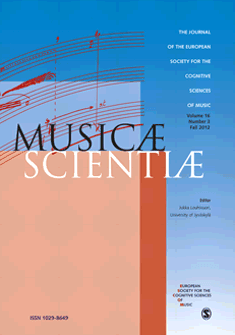
MUSICAE SCIENTIAE
Bridging Music and Psychology for Insightful DiscoveriesMUSICAE SCIENTIAE, published by SAGE Publications Ltd, is a prestigious interdisciplinary journal situated at the intersection of music and psychological studies. Established in 1997, this journal has garnered an impressive reputation, as evidenced by its 2023 Scopus rankings, where it ranks #2 in Music (Arts and Humanities) and #51 in Experimental and Cognitive Psychology. With a considerable impact factor and categorized in the Q1 and Q2 quartiles, it stands as a key resource for researchers, students, and professionals interested in the cognitive processes related to music engagement and its applications. Although it does not operate under an open access model, MUSICAE SCIENTIAE provides valuable insights and empirical studies that contribute to the ever-evolving understanding of music's impact on human behavior and cognition. By fostering a robust platform for scholarly dialogue, this journal continues to significantly influence research and practice within its fields.
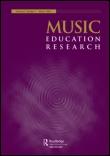
Music Education Research
Connecting Research and Practice in Music EducationMusic Education Research is a prestigious journal dedicated to advancing scholarship in the field of music education, published by Routledge Journals, Taylor & Francis Ltd. With a significant impact factor reflected in its Q1 ranking in Music and Q2 in Education for 2023, this journal is a critical resource for researchers, educators, and practitioners alike. It consistently ranks high in both the Arts and Humanities and Social Sciences categories, with an impressive position of Rank #8 in Music out of 180 journals, indicating its influence in shaping contemporary discourse. Aimed at fostering innovation and critical examination within music education, Music Education Research invites submissions that explore a broad spectrum of topics, encompassing pedagogical practices, policy implications, and curriculum development. Operating from the United Kingdom, the journal provides a vital platform for sharing cutting-edge research and is committed to improving music learning experiences across various educational contexts.
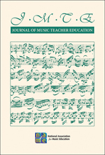
Journal of Music Teacher Education
Exploring New Horizons in Music Pedagogy.The Journal of Music Teacher Education, published by SAGE Publications Inc, is a leading scholarly outlet dedicated to advancing the field of music education. With an ISSN of 1057-0837 and an E-ISSN of 1945-0079, this journal explores a wide array of topics pertinent to music teaching and learning, serving as a vital resource for both researchers and practitioners in the music education community. Since its inception in 1991, it has consistently been positioned among the top-tier journals in both music and education, achieving a notable Q1 ranking in music and Q2 in education as of 2023. With impressive Scopus rankings, placing it in the 89th percentile for music and 47th percentile for education, the journal plays a crucial role in facilitating dialogue and disseminating innovative research aimed at improving music pedagogy. While not an open-access publication, it provides access to invaluable insights and practices that inform both theory and application in music education, making it an essential read for educators, students, and researchers alike, as they navigate the evolving landscape of music teaching. Explore the latest findings and thought-provoking discussions that shape the future of music education in the United States and beyond.
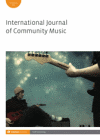
International Journal of Community Music
Innovating Research for a Harmonious TomorrowThe International Journal of Community Music, published by INTELLECT LTD, stands at the forefront of interdisciplinary research in the field of community music. With an ISSN of 1752-6299 and an E-ISSN of 1752-6302, this esteemed journal has made significant contributions to the understanding of music as a vehicle for social inclusion, cultural expression, and community building since its inception in 2008. Operating from the United Kingdom, the journal is well-regarded within the academic community, boasting a Q1 ranking in Music and a commendable 85th percentile position in the Scopus Arts and Humanities category. The journal provides a platform for innovative research, case studies, and critical discussions that explore the dynamic relationships between music and community engagement. With a focus on fostering new knowledge and practices, the International Journal of Community Music serves as an essential resource for researchers, practitioners, and students who are passionate about the transformative power of music in society.
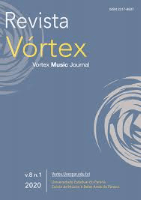
Revista Vortex-Vortex Music Journal
Amplifying Voices in the World of Music StudiesRevista Vortex-Vortex Music Journal is a premier open-access journal published by the Universidade Estadual do Paraná, specifically through its esteemed Escola de Música & Belas Artes do Paraná. With its ISSN 2317-9937, this journal serves as a critical platform for the dissemination of research and discourse in the field of musicology, music education, and the performing arts. Established in 2014, the journal has been dedicated to fostering scholarly exchange among researchers, practitioners, and students, emphasizing the significance of music as a cultural artifact and academic pursuit. As an open-access publication, it ensures that findings are readily available to a global audience, promoting inclusivity and engagement in the field. Located in Curitiba, Brazil, Revista Vortex invites contributions that explore a diverse range of topics and methodologies, seeking to enhance the understanding of music in contemporary society.